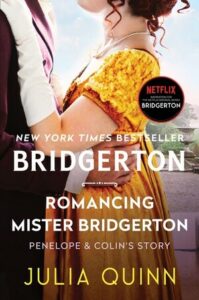
![]()
Romancing Mister Bridgerton
Julia Quinn
Fiction, audiobook
“ ‘Isn’t it nice,’ the older lady said, leaning in so that only Penelope could hear her words, ‘to discover that we’re not exactly what we thought we were?’ ”
Penelope Featherington has loved Colin Bridgerton for more than half her life, with zero expectation that he would ever return her affections. Now nearly 30, she’s (mostly) content to remain a wallflower. But fate has something other than spinsterhood in mind for Penelope.
Okay, look. Are these books a little silly? Do the spicy scenes go on a little too long? Are the dude characters kind of jerks? Maybe. But season 3 of Bridgerton —which is genuinely good — won’t be here till May and I need something to tide me over.
Read if you like a solid combination of pearl-clutching and smut!
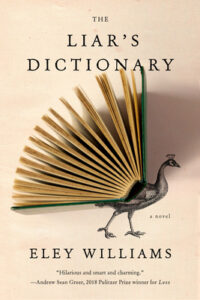
![]()
The Liar’s Dictionary
Eley Williams
Fiction, hardback, library book
“Mountweazel (mount-wee-zuhl, noun): A decoy entry in a reference work, such as a dictionary or encyclopedia, secretly planted among the genuine entries to catch other publishers in the act of copying content.“
Three years into her internship at a down-and-out publishing company, Mallory is informed that their singular project, the digitization of a 19th century dictionary, is in jeopardy. An unknown number of the thousands of entries are fake, and she’ll have to re-verify every single one. As she combs through the cards, the fake entries begin to tell the story of their creator. What were Peter Winceworth’s hopes and fears, and what made him sabotage the company’s work?
Williams’ novel showed up on my StoryGraph recommended list, and I picked up a copy just before the holidays. The plot is simple (man fills dictionary with fake words, and 100 years later a woman finds them), but the story itself is more complicated. Peter and Mallory are each doing their own hiding. I loved learning about mountweazels and enjoyed spotting their origins throughout Peter’s chapters.
Give this a try if you love the art of words, time jumps, and a “quieter” kind of tale.
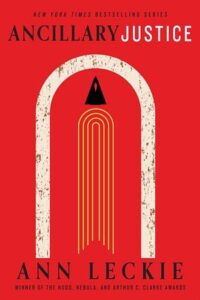
![]()
Ancillary Justice
Ann Leckie
Fiction, audiobook, DNF
“If you’re going to do something that crazy, save it for when it’ll make a difference. But absent near-omniscience there’s no way to know when that is. You can only make your best approximate calculation. You can only make your throw and try to puzzle out the results afterward.”
It has been 19 years since the soldier now known as Breq was ripped from the only home she could remember. She was once Justice of Toren, a sentient starship connected to thousands of ancillaries. But now she is just one body, one mind — and determined to get revenge against those that betrayed her.
First book club selection of the year — and also the first DNF. I didn’t dislike this story; the worldbuilding was interesting, I liked the concept of the Radch and their mega-AI ships and soldiers. Unfortunately I couldn’t bring myself to care about any of the characters or the plot. I got past the halfway point and realized I was bored and having trouble paying attention. I always give book club selections more time before I decide to call it quits, but in the end this one just didn’t hold my interest.
Read this if you enjoy hard sci-fi, interesting explorations of the possibilities of AI, and don’t mind muddling through a lot of exposition to find the plot.
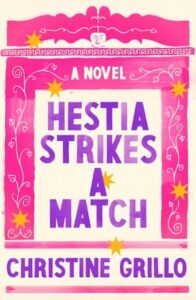
![]()
Hestia Strikes a Match
Christine Grillo
Fiction, hardback
“Civil war or no, you still need to meet friends, and you still want the thrill of a first kiss. Pipe bombs can kill you quickly, but loneliness will kill you slowly. Life is a near-constant calculation of risks.”
Hestia never guessed that she’d find herself in the midst of a second civil war. Her estranged husband is fighting for the Union, her parents are inching toward the Confederacy, and the threat of injury or death is high — but somehow life goes on. Now if she could only go on a date that wasn’t a disaster.
Reading this book was an uncomfortable but fascinating experience. The idea of a modern civil war sometimes feels very likely indeed, and I don’t like thinking about it. Strangely enough, however, this book makes me think of Erik Larson’s The Splendid and the Vile, which focuses on the Blitz of WWII when Britain experienced constant bombings for a year. Despite the chaos people still went to work, traveled, visited friends, dated, got married, had children. Life went on because what were the other options? Grillo and Larson’s books tell the stories of people who are trying to live through political or worldwide collapse and struggling to maintain relationships with people they love but will never see eye-to-eye with. I guess some things never change.
This book is worth a read, especially this year.
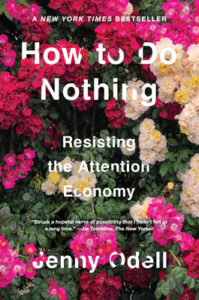
![]()
How to Do Nothing: Resisting the Attention Economy
Jenny Odell
Non-fiction, audiobook, DNF
“Some hybrid reaction is needed. We have to be able to do both: to contemplate and participate, to leave and always come back, where we are needed.”
Disdain for the attention economy isn’t new; nor is the knowledge that going “off grid” forever isn’t a feasible solution for 99.9% of the population. So what can the average person do to disconnect from addictive technology and the obsession with productivity? Odell’s book is an attempt to resolve that challenge.
Second DNF of the year, this bodes well. While I liked the concept of this book, the execution left much to be desired. Odell comes across as wordy and pretentious, spending 256 pages getting across an idea that could be captured in less than half that. I lost count of the levels of irony involved in losing my focus while listening to a book about the attention economy that sets up a plan for avoiding productivity.
Feel free to skip this one.
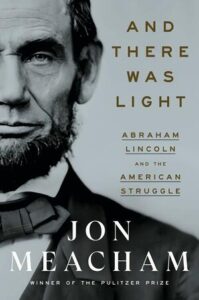
![]()
And There Was Light: Abraham Lincoln and the American Struggle
Jon Meacham
Non-fiction, paperback
“For so long as we are buffeted by the demands of democracy, for so long as we struggle to become what we say we already are — the world’s last, best hope, in Lincoln’s phrase — we will fall short of the ideal more often than we meet the mark. It is a fact of American history that we are not always good, but that goodness is possible. Not universal, not ubiquitous — but possible.”
The path of Abraham Lincoln’s presidency is well-trod. Throughout the Civil War and in the 160 years since, much ink has been spilled in the fight to vilify or deify him. Were his actions the result of cold calculation, or a sign of his pure goodness? Meacham’s biography does its best to thread the needle between these dichotomies. The truth of Lincoln’s character lies somewhere in the middle, influenced by his understanding of faith and morality as well as the realities of the world in which he lived.
I love reading about Abraham Lincoln. He was a complicated person with complicated feelings who led the country through its most complicated season. And There Was Light is an impeccably detailed study of a man who was shaped by the time in which he lived, but was open enough to imagine and move his country toward a world in which good was possible.
Add this to your TBR if you enjoy history, character studies, and hard truths.
Photo by Mira Kemppainen on Unsplash






